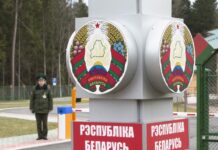
Lithuanian farmers continue their protests against the government’s agricultural policy, which they started in early January. Several thousand farmers and their supporters gathered on January 24 for a rally outside the government office in central Vilnius. They brought about a thousand tractors and forestry trucks to central Vilnius on the 23rd.
Ignas Hofmanas, chair of the Lithuanian Agriculture Council, the organizer of the protest, told the crowd “We say enough is enough, enough of the anti-agriculture policy, enough of the misinformation, enough of the dirt on agriculture, and we are not backing down from our demands. We will wait for the government’s decisions, and with your support and force we will try to achieve the fairest solutions for agriculture”.
People are holding banners saying “No farmers, no food, no future” or “Without us, no bread or sausage”. One of the banners features cows standing in front of a guillotine labelled “the government”. When a video of Agriculture Minister Kęstutis Navickas speaking about farmers’ problems in early 2023 was shown from the stage, protesters booed him.
Dainius Arlauskas, a representative of the Lithuanian Agriculture Council, told BNS earlier that Prime Minister Ingrida Šimonytė, Parliament Speaker Viktorija Čmilytė-Nielsen, Deputy Agriculture Minister Egidijus Giedraitis, Agriculture Minister Kęstutis Navickas, Environment Minister Simonas Gentvilas, and Viktoras Pranckietis, chair of the parliamentary Committee on Rural Affairs, had all been invited to address the crowd. Ieva Skarelytė, spokeswoman for the prime minister, told BNS that the prime minister would not go out to meet with the farmers because she had already met with them.
 The organizers of the protest had agreed with the Vilnius authorities on a rally involving 3,500 people, and the protest is expected to last two days. The farmers had also made arrangements with the authorities regarding the parking of tractors on the city’s central streets. Central Gedimino Avenue is closed to car traffic, but cars can cross it at some junctions. Only police vehicles and ambulances can pass the tractors on the avenue.
The organizers of the protest had agreed with the Vilnius authorities on a rally involving 3,500 people, and the protest is expected to last two days. The farmers had also made arrangements with the authorities regarding the parking of tractors on the city’s central streets. Central Gedimino Avenue is closed to car traffic, but cars can cross it at some junctions. Only police vehicles and ambulances can pass the tractors on the avenue.
Several dozen environmentalists staged a counter-protest in Vilnius on Wednesday, asking the government not to relax environmental protections opposed by farmers. They are calling on the government not to make concessions during talks with farmers at the expense of environmental protection. The activists are holding banners with information about the extinction of bird species, climate change data, and why it is necessary to preserve endangered grasslands.
 Edmundas Greimas of the Lithuanian Fund for Nature says that the ecological situation in agriculture has been deteriorating over the last 20 years amid intensifying farming and a lack of sustainable solutions. And when the government decides to take measures, farmers do not take this into account.
Edmundas Greimas of the Lithuanian Fund for Nature says that the ecological situation in agriculture has been deteriorating over the last 20 years amid intensifying farming and a lack of sustainable solutions. And when the government decides to take measures, farmers do not take this into account.
“I do understand that farmers are unhappy, and maybe the measures are radical, maybe they are too sudden, maybe they should have been taken in smaller steps, but we, as representatives of society and nature, do not like it, we do not like the fact that biodiversity is disappearing, that they plough up to the edge of a ditch or a stream, and that all the fertilizers are getting there,” Greimas said.
“More and more fertilizers are flowing from Lithuania into the Baltic Sea, causing blooms, and all countries are concerned, nobody knows how to solve the problem. The Environment Ministry has proposed three-metre water protection zones, but farmers say they can’t do a single metre and they want to plough everywhere,” he added. Farmers’ demands include continuing tax cuts on fuel and lightening strict regulation on protection zones and grasslands, as well as higher raw milk prices.
The protesters have put forward six main demands to the government. They are asking the government to stop the transit of Russian grain through Lithuania. As the European Union has not put sanctions on Russian food products, some farmers claim that this pushes down the prices of their grain exports.
Farmers are demanding a solution to the issue of grasslands. They are required to keep at least 5 percent of their agricultural land as grasslands, that is, not to cultivate it for at least five years. If the ratio falls below 5 percent, the National Compensation Agency obliges farmers to restore it. Those farmers that do not rear livestock say it makes no economic sense for them to keep part of their land unused.
Farmers also want the government to ensure a minimum above-cost price at which processors buy their milk. This is an old issue, on which dairy farmers held protests last year across Lithuania following a sharp drop in raw milk prices.
The protesters want to call off new rules on marked – that is, untaxed – fuel. Under the rules, green diesel can no longer be used in vehicles that can be used for purposes other than agriculture, such as trucks, trailers, etc.
Farmers also resent that buffer zones around water bodies and protected areas are subtracted from their land. They demand that when these zones are expanded, it not be done at their expense or that they are compensated.
The government has recently scrapped a tax exemption on petroleum gas. The excise duty now stands at 304.1 euros per tonne. Farmers want the exemption returned.
Even before the farmers’ protest began, Agriculture Minister Kęstutis Navickas told LRT RADIO that he had taken steps to “correct the mistakes made”. He specifically meant the raised taxes on petroleum gas and marked fuel.
“Draft legislation has been published in the Register of Legislative Acts on reintroducing the former regime on green diesel, as well as reducing the excise duty on petroleum gas to 41 euros [per tonne],” the minister said. He also said that the ministry would continue to talk with farmers about their remaining demands.





























